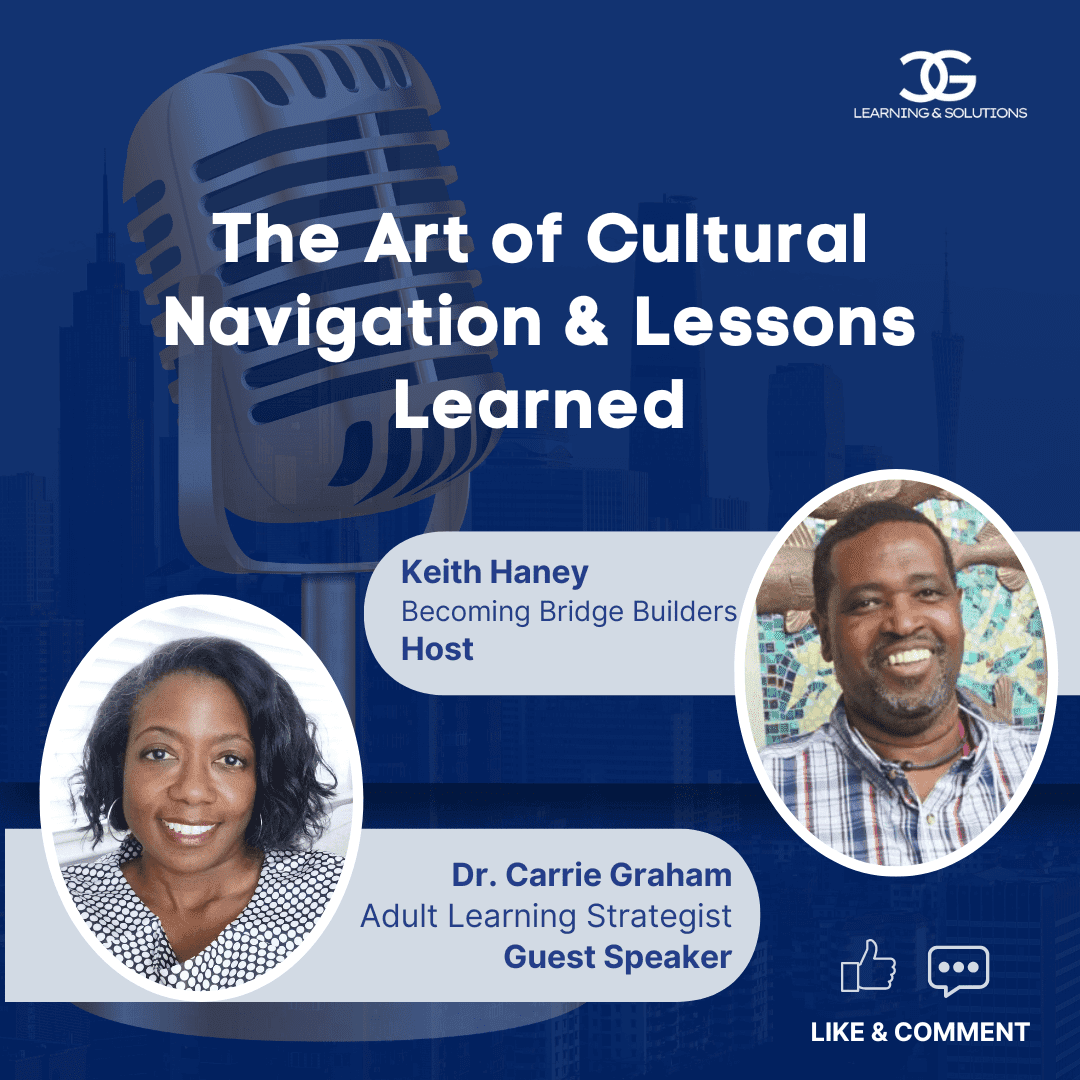Episode Overview
This episode features Dr. Carrie Graham, an adult learning strategist and training consultant, discussing her journey from being "the only brown face" in predominantly white educational and professional environments to becoming an expert in customized learning approaches. The conversation explores themes of cultural navigation, professional development, validation, and creating inclusive learning environments.
Listen Here > https://www.becomingbridgebuilders.org/podcast/episode/78996284/the-art-of-cultural-navigation-insights-from-dr-carrie-graham
10 Key Points
- Cultural Navigation as a Life Skill: Both host and guest shared experiences of being "only children" who later became cultural translators, learning to navigate between different racial and cultural environments while maintaining authenticity in both spaces.
- Adult Learning is Fundamentally Different: Adults bring rich life experiences, motivations, and barriers to learning that must be acknowledged and leveraged, unlike children who are "blank slates" requiring different educational approaches.
- The Power of Simple Wisdom: Dr. Graham's mother's advice to "just do your best" became a foundational principle that provided freedom and peace when fully understood and embraced in adulthood.
- Professional Development Requires Personal Understanding: Effective training and development programs must focus on understanding participants as individuals first, then build content and delivery methods around their unique experiences and needs.
- Validation Comes from Within: Dr. Graham's transformative moment came when she realized she didn't need external validation from others, particularly in professional settings, because her validation comes from God and her own capabilities.
- Code-Switching as Survival and Strength: The ability to navigate multiple cultural spaces shouldn't be criticized but recognized as a valuable skill that enables broader impact and understanding across diverse communities.
- Engagement Over Entertainment: True adult learning engagement goes beyond games and icebreakers to create meaningful connections between new concepts and learners' personal experiences and motivations.
- One-Size-Fits-All Approaches Fail: Whether in education, workplace training, or even church settings, standardized approaches that don't account for individual differences and experiences are ineffective and can be harmful.
- Legacy Through Simplicity and Beauty: Dr. Graham's vision for her legacy centers on helping others live their fullest lives by taking a simple approach that reflects God's love and creates beautiful transformations in people's lives.
- Professional Development Must Address the Whole Person: Effective training considers how learning experiences affect not just professional performance but also how participants show up in their personal relationships and communities.
10 Takeaways/Action Items
- Ask Participants About Their Readiness: Before beginning any training or professional development session, ask participants where they are emotionally and mentally regarding the topic, rather than assuming enthusiasm or readiness to learn.
- Research Your Audience as Individuals: Move beyond job titles and demographics to understand participants' life experiences, challenges, and what they bring to the learning environment when designing training and development programs.
- Embrace Cultural Translation Skills: Recognize and value the ability to navigate different cultural spaces as a strength that can bridge divides in workplace settings and community interactions.
- Create Space for Reflection: Build intentional pauses and reflection time into training sessions to allow adults to process information and connect it to their personal experiences before moving forward.
- Address the Elephant in the Room: When facilitating difficult topics or potentially uncomfortable content, acknowledge participants' likely concerns upfront and create space for authentic engagement with challenging material.
- Focus on Application, Not Just Information: Ensure that training and development programs include clear pathways for participants to apply new skills and knowledge in their real-world contexts.
- Develop Your Facilitation Skills: Invest in learning adult learning principles and facilitation techniques rather than relying solely on traditional teaching methods, especially when working with professional audiences.
- Personalize Learning Experiences: Use assessments, pre-conversations, or small group settings to gather information that allows for more customized approaches to professional development and leadership skills training.
- Validate Individual Experiences: Create training environments where participants feel their voices are heard and their unique perspectives are valued, which increases engagement and retention.
- Consider the Ripple Effect: Remember that how people experience professional development and training affects not just their work performance but also how they show up in their personal relationships and communities, making the quality of learning experiences even more critical.
Resources
